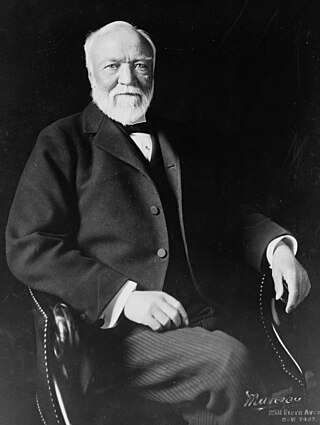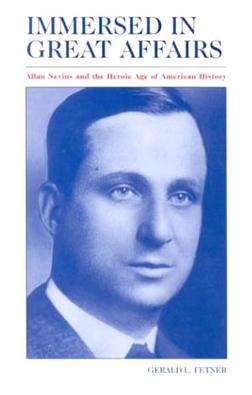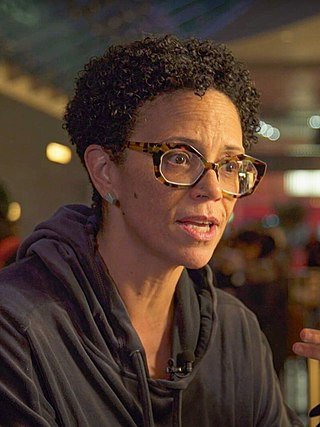Related Research Articles

Abraham Lincoln was an American lawyer, politician, and statesman who served as the 16th president of the United States from 1861 until his assassination in 1865. Lincoln led the Union through the American Civil War to defend the nation as a constitutional union and succeeded in abolishing slavery, bolstering the federal government, and modernizing the U.S. economy.

Andrew Carnegie was a Scottish-American industrialist and philanthropist. Carnegie led the expansion of the American steel industry in the late 19th century and became one of the richest Americans in history. He became a leading philanthropist in the United States, Great Britain, and the British Empire. During the last 18 years of his life, he gave away around $350 million, almost 90 percent of his fortune, to charities, foundations and universities. His 1889 article proclaiming "The Gospel of Wealth" called on the rich to use their wealth to improve society, expressed support for progressive taxation and an estate tax, and stimulated a wave of philanthropy.

Joseph Allan Nevins was an American historian and journalist, known for his extensive work on the history of the Civil War and his biographies of such figures as Grover Cleveland, Hamilton Fish, Henry Ford, and John D. Rockefeller, as well as his public service. He was a leading exponent of business history and oral history.

Allan Rex Sandage was an American astronomer. He was Staff Member Emeritus with the Carnegie Observatories in Pasadena, California. He determined the first reasonably accurate values for the Hubble constant and the age of the universe.

Eric Foner is an American historian. He writes extensively on American political history, the history of freedom, the early history of the Republican Party, African American biography, the American Civil War, Reconstruction, and historiography, and has been a member of the faculty at the Columbia University Department of History since 1982. He is the author of several popular textbooks. According to the Open Syllabus Project, Foner is the most frequently cited author on college syllabi for history courses.

Thomas Alexander Scott was an American businessman, railroad executive, and industrialist. In 1861, President Abraham Lincoln appointed him to serve as U.S. Assistant Secretary of War, and during the American Civil War railroads under his leadership played a major role in the war effort. He became the fourth president of the Pennsylvania Railroad (1874–1880), which became the largest publicly traded corporation in the world and received much criticism for his conduct in the Great Railroad Strike of 1877 and as a "robber baron." Scott helped negotiate the Republican Party's Compromise of 1877 with the Democratic Party; it settled the disputed presidential election of 1876 in favor of Rutherford B. Hayes in exchange for the federal government pulling out its military forces from the South and ending the Reconstruction era. In his final years, Scott made large donations to the University of Pennsylvania.
Earl Lewis is the founding director of the Center for Social Solutions and professor of history at the University of Michigan. He was president of the Andrew W. Mellon Foundation from 2013 to 2018. Before his appointment as the president of the Andrew W. Mellon Foundation, Lewis served for over eight years as Provost and Executive Vice President for Academic Affairs and as the Asa Griggs Candler Professor of History and African American Studies at Emory University. He was the university's first African-American provost and at the time the highest-ranking African-American administrator in the university's history.

David Brion Davis was an American intellectual and cultural historian, and a leading authority on slavery and abolition in the Western world. He was a Sterling Professor of History at Yale University, and founder and director of Yale's Gilder Lehrman Center for the Study of Slavery, Resistance, and Abolition.
Lynne Barrett is an American writer and editor, best known for her short stories.

Allen Carl Guelzo is an American historian who serves as Senior Research Scholar in the Council of the Humanities and Director of the Initiative on Politics and Statesmanship in the James Madison Program at Princeton University. He formerly was a professor of History at Gettysburg College.
Douglas L. Wilson is the George A. Lawrence Distinguished Service Professor Emeritus of English at Knox College in Galesburg, Illinois, where he taught from 1961 to 1994. He then was the founding director of the Robert H. Smith International Center for Jefferson Studies at the Thomas Jefferson Foundation (Monticello) in Charlottesville, Virginia. In his retirement, he returned to Knox College to found and co-direct the Lincoln Studies Center with his colleague Rodney O. Davis.
Jane Marcus (1938–2015) was a pioneering feminist literary scholar, specializing in women writers of the Modernist era, but especially in the social and political context of their writings. Focusing on Virginia Woolf, Rebecca West, and Nancy Cunard, among many others, she devised groundbreaking analyses of Woolf's writings, upending a generation of criticism that ignored feminist, pacifist, and socialist themes in much of Woolf's work and critique of imperialism and bourgeois society. Marcus's understanding of Woolf's place within the larger context of English literature has become prevailing wisdom today in the fields affected by her theorization and research, despite the controversial nature of her positions when they were originally formulated and how much opposition she garnered from earlier scholars and critics.

Coco Fusco is a Cuban-American interdisciplinary artist, writer, and curator whose work has been exhibited and published internationally. Fusco's work explores gender, identity, race, and power through performance, video, interactive installations, and critical writing.

Failure is the state or condition of not meeting a desirable or intended objective, and may be viewed as the opposite of success. The criteria for failure depends on context, and may be relative to a particular observer or belief system. One person might consider a failure what another person considers a success, particularly in cases of direct competition or a zero-sum game. Similarly, the degree of success or failure in a situation may be differently viewed by distinct observers or participants, such that a situation that one considers to be a failure, another might consider to be a success, a qualified success or a neutral situation.

David S. Reynolds is an American literary critic, biographer, and historian who has written about American literature and culture. He is the author or editor of fifteen books, on the Civil War era—including figures such as Walt Whitman, Abraham Lincoln, Herman Melville, Nathaniel Hawthorne, Edgar Allan Poe, Ralph Waldo Emerson, Henry David Thoreau, Emily Dickinson, Harriet Beecher Stowe, George Lippard, and John Brown. Reynolds has been awarded the Bancroft Prize, the Lincoln Prize, the Christian Gauss Award, the Ambassador Book Award, the Gustavus Myers Book Award, the John Hope Franklin Prize, and was a finalist for the National Book Critics Circle Award. He is a regular reviewer for The New York Times Book Review.
Elaine A. King is a curator, critic, professor, and editor.
Karen Ordahl Kupperman is an American historian who specializes in colonial history in the Atlantic world of the sixteenth and seventeenth centuries.
The following is a list of the published works of James M. McPherson, an American Civil War historian.
Edward Chaney is a British cultural historian. He is Professor Emeritus at Solent University and Honorary Professor at University College London . He is an authority on the evolution of the Grand Tour, Anglo-Italian cultural relations, the history of collecting, Inigo Jones and the legacy of ancient Egypt. He also publishes on aspects of 20th-century British art. In 2003, he was made a Commendatore of the Italian Republic. He is the biographer of Gerald Basil Edwards, author of The Book of Ebenezer Le Page which he succeeded in publishing following the author's death in 1976. This has since been recognised as a twentieth-century classic.
References
- ↑ Scott Sandage homepage". Carnegie Mellon University, Department of History. Accessed July 18, 2023.
- ↑ "Author and Cultural Historian Scott Sandage to Deliver 17th Annual Levine Lecture Archived 2009-01-10 at the Wayback Machine ". Rider University, September – May 2009. Accessed July 29, 2009.
- ↑ "Born Losers book website". Scott Sandage. Retrieved 2020-11-06.